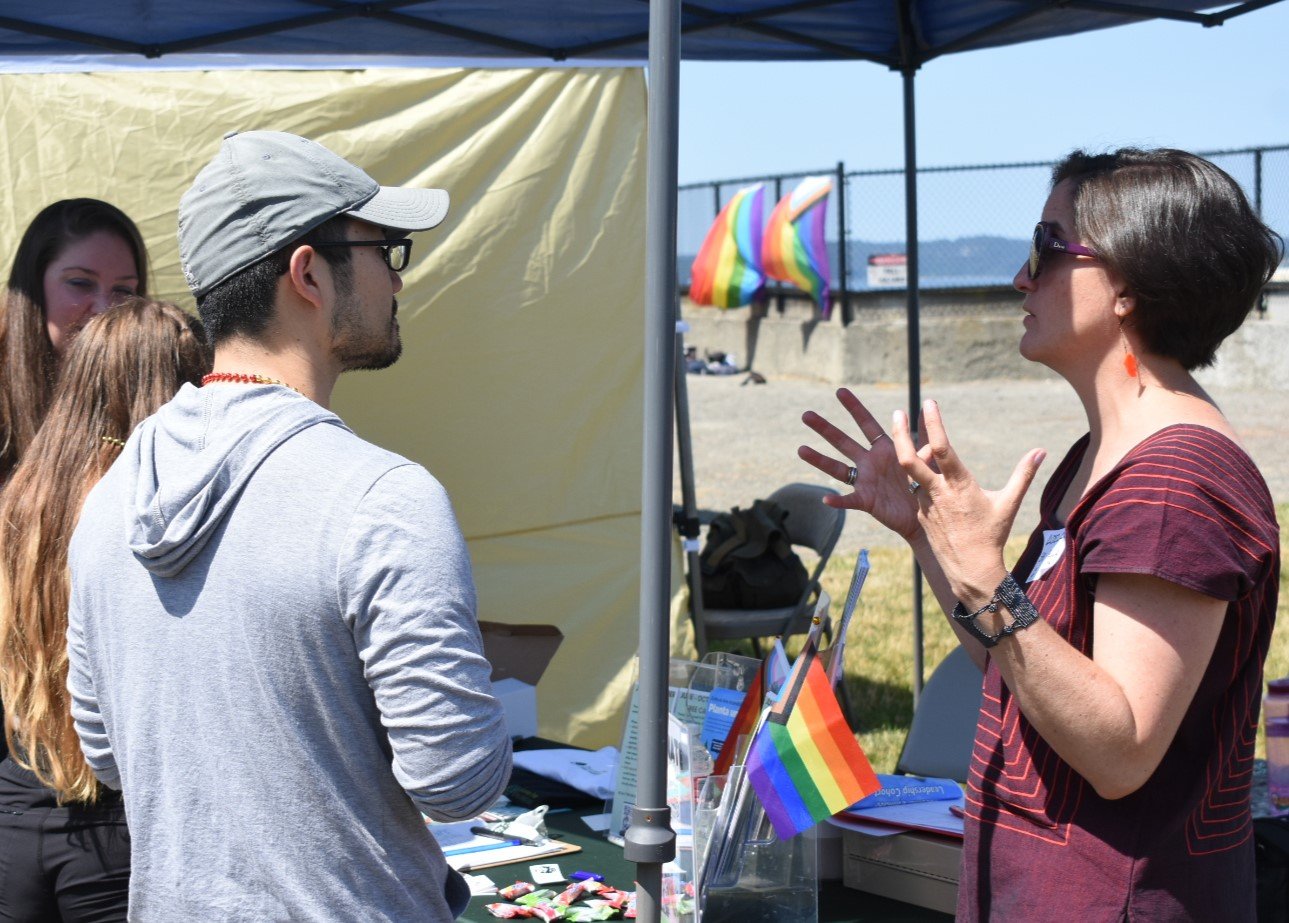A Queering of the Urban Forest: Why We Value Pride
By Eden Standley
This July, we at the Tacoma Tree Foundation have been spending a lot of our time participating in Tacoma’s vibrant Pride events. For TTF, these events have weight, first because it’s a chance to reach new people who, as members of a historically marginalized community, likely live in neighborhoods where we focus our regreening efforts. And secondly because, although not all of us staff at TTF identify as Queer, we recognize that our organization is, and that we need to involve more of the local LGBTQIA+ community in our work.
Our staff in conversation with Pride attendees on July 8, 2023. Photo Credit: Eden Standley.
Being a Queer organization is different from being Queer-owned or Queer-focused. The way I think about it is, to quote Diaspora Co.’s Queer business manifesto: “being queer isn’t about your preferences or your sexuality, rather your willingness to defy what is seen as “normal” and embrace the possibilities of wild, magical, and radical ways of being.” I feel that our organization embodies this value with our mission to educate, empower, and support community members in neighborhood-based greening, because when we do this, we are also teaching people how to take pride in themselves, their environments, and their communities.
I want to invite you to think deeper about what Pride is. We use the word in noun form to talk about the LGBTQIA+ community celebrations, and the verb “to have or take Pride'' means to have a consciousness of one’s own dignity. But I’d like to suggest a new definition that shows how these two meanings connect: Pride as the practice of knowing ourselves, that we deserve safety, equity, and justice to be present in the environments around us. Pride then also becomes the practice of protecting diversity, because without diversity we cannot have the safe, equitable, and just environments we deserve to live in.
Eden Standley tabling at the McKinley Hill Work Party on July 15, 2023.
As a young Queer person who works within the urban forest I’ve begun to ask, what do trees and ecosystems have to do with Pride? Diversity is the foundation of healthy ecosystems, as well as healthy human economies and cultures, and the diversity of one supports the diversity and sustainability of the other. For example, imagine a neighborhood where only one type of tree is planted, if a disease or pest that affects that type of tree was introduced to the area, many of those trees would die, leaving the canopy coverage reduced or completely depleted (See Dutch Elm Disease Epidemic). Lack of canopy coverage from mature trees would have long-term health effects on the people and culture in the area, as trees provide shade, cleaner air, and mental health benefits.
Queer environmental justice is the intersection of Pride and ecological preservation. It seeks to achieve climate justice through protecting and promoting diversity of people and ecology. If we reevaluate our ideas on what healthy urban forests and human societies look like, making diversity a priority, we can create sustainable ecological and socio-economic systems that will preserve urban canopy coverage as well as human health and quality of life.
With stronger systems, the users of those systems are more likely to flourish, and we will see that flourishing is an outcome of Pride. Part of the solution to climate change is recognizing that Pride, LGBTQIA+ justice, racial justice, and environmental justice are connected. And it is important to understand that like some of us at TTF, you do not have to identify as an LGBTQIA+ person in order to share Queer environmental justice values: the movement will always require the support of allies.
Lastly, I ask you to look around Tacoma—where do you see people taking pride in their environments? It’s likely that you, too, notice Pride is more visible in historically privileged parts of town where people have the time, money, and resources to build systems where people and ecology can flourish. At TTF, we want to promote ecological and social flourishing by empowering you–diverse groups of Puget-Sounders–to reclaim and take visible Pride in your spaces—indoors and out—by giving you the tools and resources to do so. We believe that by working together to grow diversity, and the urban forest, we can heal our relationships to each other and the land.
Ocean Fest attendees having fun with chalk. June 2023. Photo Credit: Eden Standley.



